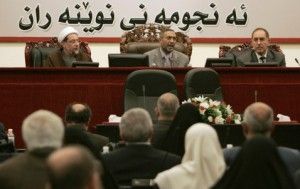Iraqi Youth Struggles Against Old Guard
BAGHDAD — Inspired by the democratic uprisings around the Arab world to push for change, young lawmakers in Parliament are running up against an ossified political elite still dominated by the exiles who followed American tanks into Iraq to establish a fragile, violence-scarred democracy.
On the streets, the voices of young demonstrators and journalists have been muted by the batons and bullets of elite security units that answer only to a prime minister who officials say personally sends orders by text message.
An Iraq spring it is not.
In a country where the demographics skew even younger than in places like Egypt, Tunisia and Libya, the wave of political change in the region has laid bare a generation gap here split by old resentments nurtured by dictatorship and war and a youthful grasping for a stake in the new Iraq. “The younger generation is ready to go forward; they are carrying less resentments,” said Rawaz M. Khoshnaw, 32, a Kurdish member of Parliament, in a recent interview.
But the forces of youth are blunted by the same forces that have robbed Iraqi society of so much for so long — violence, a stagnant economy, zero-sum politics and sectarianism — and that have prevented a new political class from emerging to take Iraq into a new democratic future.
A common sentiment from nearly three dozen interviews with young Iraqis around the country recently is a persistent disenchantment with both their political leaders and the way democracy has played out here. “The youth is the excluded class in the Iraqi community,” said Swash Ahmed, a 19-year-old law student in Kirkuk. “So they’ve started to unify through Facebook or the Internet or through demonstrations and evenings in cafes, symposiums and in universities. But they don’t have power.”
Iraq’s unity government is showing increased signs of splintering over an American-backed power-sharing agreement. If the government fractures and a narrow majority of Shiite parties led by Prime Minister Nuri Kamal al-Maliki, a former exile, takes control, the result would be more divisiveness and potentially more violence.
For the young, it would be another sign of the difficulty in gaining a voice in Iraq’s democracy, and a counternarrative to the grand new history being written elsewhere in the Middle East.
In Basra, Salah Mahmod, 18, said politicians here were “in love with power.”
“We don’t have democracy, and the politicians have no idea what it means.”
Click here to read more.


